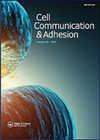Pannexin1单核苷酸多态性与心血管患者血小板反应性
Q2 Biochemistry, Genetics and Molecular Biology
引用次数: 11
摘要
Pannexin1 (Panx1)是一种膜通道形成蛋白,允许小分子(如ATP)通过,在人血小板中表达。最近,我们发现抑制Panx1会影响胶原诱导的血小板聚集,但不会影响其他激动剂引发的血小板聚集。我们还发现单核苷酸多态性(SNP;rs1138800)在Panx1基因中编码一个功能获得通道(Panx1- 400c),并与胶原诱导的血小板反应性增强有关。在这项研究中,我们评估了来自ADRIE研究的758名接受阿司匹林和/或氯吡格雷治疗的稳定心血管患者的SNP与血小板反应性的关系。我们发现,在稳定性心血管患者中,Panx1-400C等位基因的存在与血小板反应性无关,与使用血小板聚集激动剂(胶原蛋白、ADP或花生四烯酸)或抗血小板药物方案无关。此外,Panx1-400A > C SNP也不影响相同稳定心血管患者队列中心脏缺血事件的再发生。本文章由计算机程序翻译,如有差异,请以英文原文为准。
Pannexin1 Single Nucleotide Polymorphism and Platelet Reactivity in a Cohort of Cardiovascular Patients
Abstract Pannexin1 (Panx1), a membrane channel-forming protein permitting the passage of small-sized molecules, such as ATP, is expressed in human platelets. Recently, we showed that inhibiting Panx1 affects collagen-induced platelet aggregation but not aggregation triggered by other agonists. We also found that a single nucleotide polymorphism (SNP; rs1138800) in the Panx1 gene encoded for a gain-of-function channel (Panx1-400C) and was associated with enhanced collagen-induced platelet reactivity. Here, we assessed the association of this SNP with platelet reactivity in a cohort of 758 stable cardiovascular patients from the ADRIE study treated with aspirin and/or clopidogrel. We found that presence of the Panx1-400C allele was not associated with platelet reactivity in stable cardiovascular patients, irrespective of the platelet aggregation agonist used (collagen, ADP or arachidonic acid) or the anti-platelet drug regimen. Moreover, the Panx1-400A > C SNP did also not affect the re-occurrence of cardiac ischemic events in the same stable cardiovascular patient cohort.
求助全文
通过发布文献求助,成功后即可免费获取论文全文。
去求助
来源期刊

Cell Communication and Adhesion
生物-生化与分子生物学
CiteScore
2.50
自引率
0.00%
发文量
0
审稿时长
>12 weeks
期刊介绍:
Cessation
Cell Communication and Adhesion is an international Open Access journal which provides a central forum for research on mechanisms underlying cellular signalling and adhesion. The journal provides a single source of information concerning all forms of cellular communication, cell junctions, adhesion molecules and families of receptors from diverse biological systems.
The journal welcomes submission of original research articles, reviews, short communications and conference reports.
 求助内容:
求助内容: 应助结果提醒方式:
应助结果提醒方式:


